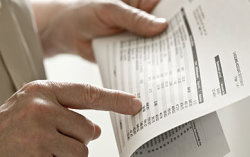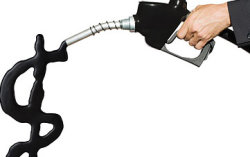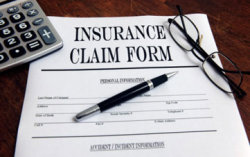We've updated our popular list of money-wasters with even more tips and resources to help you cut unnecessary expenses from your budget. Consider these 28 common ways people waste money. If any of them sound familiar, start plugging your budget holes right away.
Carrying a Balance
Debt is a shackle that holds you back. For instance, if you have a $1,000 balance on a credit card that charges an 18% rate, you blow $180 every year on interest. Carrying a balance can also cost you down the line in the form of a lower credit score that will trigger higher interest rates on your loans.
Get in the habit of paying off your balance in full each month - or at least limiting your balance to 25% or less of your available credit.
Buying Brand-Name Instead of Generic
From groceries to clothing to prescription drugs, you can save money by choosing an off-brand over a fancy label. And in many cases, you won't sacrifice much in quality. Clever advertising and fancy packaging don't make brand-name products better than lesser-known brands. For example, a 30-day supply of cholesterol-lowering drug Lipitor costs about $154, but a generic version costs half as much, according to DestinationRx, which creates drug-comparison tools for insurers and consumers.
QUIZ: Are You Saving Enough for Retirement?
Paying Late Fees and Missing Deadlines
If you pay a stack of bills every month, it's easy to overlook one or two every now and then. But if you miss a credit card payment by even one day, you will pay a late fee of $25 ($35 if it's the second time in six months). Your credit score could also take a hit if you pay your bill late. Your history of on-time payments accounts for 35% of your FICO credit score -- more weight than any other factor. If you pay the bill within 30 days of the due date, the lender might not report the delay to the credit bureaus. But if you let the bill go longer than that, the card issuer is more likely to inform the credit agencies and turn over your case to its collections department.
If you have a good payment record -- especially if you have paid on time for an entire year -- call your card issuer and ask that the late fee be waived. To avoid missing deadlines, set up payment alerts to be delivered by e-mail or a text message from your credit card company.
Buying Insurance You Don't Need
You only need life insurance if someone, such as a child, is financially dependent upon you. That means most singles, seniors and kids don't need a policy.
Other policies you can probably do without include credit-card insurance (better to use the premium to pay down your debt in the first place), rental-car insurance (most auto policies and credit cards carry some coverage) and mortgage life insurance (a regular term-life insurance policy is more comprehensive). See 5 Insurance Policies You Don't Need for coverage that isn't worth buying.
Overspending on Gas and Oil
There's no need to spring for premium fuel if the auto manufacturer says regular is just fine. You should also check to make sure your tires are optimally inflated to get the best gas mileage. And are you still paying for an oil change every 3,000 miles? Many models nowadays can last 5,000 to 7,000 miles between changes, and some even have built-in sensors to tell you when it's time to change the oil. Check your owner's manual to find the best time for your car's routine maintenance.
To lower your gas costs even more, consider one of our picks for the 15 Most Fuel-Efficient Cars, 2013.
Keeping Unhealthy Habits
Smoking costs a lot more than what you pay for a pack of cigarettes. The average price per pack of cigarettes in the U.S. is $6.03, but the health-related costs per pack are $35, according to the American Cancer Society. Over a year, those added costs can amount to $12,775 for a pack-a-day smoker.
Another habit to quit: indoor tanning. There is now a 10% tax on indoor tanning services. As with cigarettes, the true cost of tanning -- one of the most dangerous forms of cancer-causing radiation -- is higher than the price you pay each time you go to the tanning salon.
Once you kick your bad habits, you'll save even more if you institute these six healthy habits.
QUIZ: Test Your Financial Fluency
Paying Too Much for a Mutual Fund
Mutual fund fees can weigh down performance. The average diversified U.S. stock fund charges about 1.3% a year in expenses. If your fund isn't beating its benchmark, you're better off buying a low-cost index fund or exchange-traded fund that matches the benchmark. For example, you'll pay an annual expense ratio of just 0.05% to invest in the Vanguard Total Stock Market ETF (VTI), which tracks the CRSP US Total Market Index. On a $50,000 investment, that's a savings of $625 per year over the average managed fund.
It is possible to outperform a benchmark with a well-managed fund (although it's not guaranteed). Stick with no-load funds, which can save you more than 5% in sales charges. See our favorite no-load mutual funds in the Kiplinger 25. And watch out for other nickel-and-diming, including low-balance fees or charges for paper statements.
Passing up Tax Breaks
There's a good chance you're among the millions of taxpayers who overpay taxes each year by overlooking deductions to which you're entitled. Failing to maintain a file of tax receipts throughout the year, rushing to file your taxes at the last minute, and fearing an IRS audit are all reasons that may keep you from claiming perfectly valid deductions. See if you've missed one of these commonly overlooked tax breaks. If you have, by all means, claim it! That money is yours. Just be sure you have the documentation to prove it.
Opting for a Low Insurance Deductible
A low deductible may seem appealing as you ponder a costly claim down the line, but you'll pay a lot more in higher premiums. Boosting your deductible from $200 to $500 can reduce your collision and comprehensive auto insurance premiums by 15% to 30%; raising it to $1,000 can save you 40% or more. If your homeowners insurance deductible is $500, increasing it to $1,000 can lower your premiums by up to 20%. Besides, when you have a low deductible, you might be tempted to file claims more frequently for small amounts. Insurers don't like frequent claims on your record and can punish you with higher rates.
Before raising your deductible, however, make sure you have enough cash in your emergency savings account to cover it if you ever file a claim. You won't have to rely on costly credit cards to bail you out.
Leaving Your Money in a Low-Interest Account
If you're stashing your cash in a
traditional savings account earning next to nothing, you're wasting it.
Make sure you're getting the best return on your money. Search for the highest yields on CDs and money market savings accounts. And consider using a free online checking account that pays interest, such as ones offered by Ally Bank and EverBank.





No comments:
Post a Comment